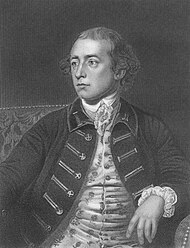Lord High Steward

The Lord High Steward of England - not to be confused with the High Steward, a court function - is the head of the Great Officers of State . Below him stand the Lord High Chancellor (Lord Chancellor) and the Lord High Treasurer (Lord Treasurer).
The incumbent primarily had to perform representative tasks such as chairing the coronation of British monarchs and elevations to the nobility. But he also performed an important judicial function: the chairmanship of trials against members of the nobility. Although initially without a political function, the importance of this position increased in the course of time so that its holder was ultimately one of the most powerful men in the kingdom.
The first Lord High Steward appears to have been Robert de Beaumont, 2nd Earl of Leicester , son of Robert de Beaumont, 1st Earl of Leicester . Since then, the office was associated with the title of Earl of Leicester until Henry Bolingbroke, Earl of Leicester and Duke of Lancaster became King of England in 1399 as Henry IV . He made his second son Thomas of Lancaster, 1st Duke of Clarence Lord High Steward. After his death in 1421, the office remained vacant, and mostly the Lord Chancellor or other members of the high nobility took over the corresponding tasks.
In order to convict a nobleman of criminal offenses, he had to be tried in the House of Lords . To this end, a person present was appointed Lord High Steward, who then directed the proceedings. Criminal proceedings against nobles in the House of Lords were not abolished until 1948.
The title should not be confused with that of Lord Steward of the Household.
Lords High Steward of England 1154–1421
- Robert de Beaumont, 2nd Earl of Leicester 1154-1168
- Robert de Beaumont, 3rd Earl of Leicester 1168-1190
- Robert de Beaumont, 4th Earl of Leicester 1190-1204
- Simon de Montfort, 5th Earl of Leicester 1206-1218
- Simon de Montfort, 6th Earl of Leicester 1218-1265
- Edmund Crouchback, 1st Earl of Lancaster 1265-1296
- Thomas Plantagenet, 2nd Earl of Lancaster 1296-1322
- Henry Plantagenet, 3rd Earl of Lancaster 1324-1345
- Henry of Grosmont, 1st Duke of Lancaster 1345-1361
- John of Gaunt, 1st Duke of Lancaster 1362-1399
- Henry of Bolingbroke, 2nd Duke of Lancaster 1399
- Thomas of Lancaster, 1st Duke of Clarence 1399-1421
Lords High Steward of England at coronations 1422 to date
- incomplete
- Edward Stafford, 3rd Duke of Buckingham 1509 Henry VIII
- John Russell, 1st Earl of Bedford 1547 Edward VI.
- Edward Stanley, 3rd Earl of Derby 1553 Jane Gray
- 1559 Elizabeth I.
- 1603 Jacob I.
- 1626 Charles I.
- James Butler, 1st Duke of Ormonde 1661 Charles II.
- James Butler, 1st Duke of Ormonde 1685 James II
- William Cavendish, 1st Duke of Devonshire 1689 William III.
- William Cavendish, 1st Duke of Devonshire 1702 Anne
- Charles Fitzroy, 2nd Duke of Grafton 1714 George I.
- Lionel Cranfield Sackville, 1st Duke of Dorset 1727 George II.
- William Talbot, 1st Earl Talbot 1761 George III.
- Henry William Paget, 1st Marquess of Anglesey 1821 George IV
- Alexander Douglas-Hamilton, 10th Duke of Hamilton 1831 William IV.
- Alexander Douglas-Hamilton, 10th Duke of Hamilton 1838 Victoria
- Charles Spencer-Churchill, 9th Duke of Marlborough 1902 Edward VII.
- Henry George Percy, 7th Duke of Northumberland 1911 George V.
- James Gascoyne-Cecil, 4th Marquess of Salisbury 1937 George VI.
- Andrew Cunningham, 1st Viscount Cunningham of Hyndhope 1953 Elizabeth II.
Lords High Steward of England at trials against members of the nobility from 1422 to the present day
- incomplete until 1660
- Henry Stafford, 2nd Duke of Buckingham in the trial against
- John de Vere, 13th Earl of Oxford in the trial against
- Thomas Howard, 2nd Duke of Norfolk in the process against
-
Thomas Howard, 3rd Duke of Norfolk in the process against
- Anne Boleyn 1536
- Thomas Audley, 1st Baron Audley von Walden in the trial against
-
William Parr, 1st Marquess of Northampton in the trial against
- Lord Wentworth 1559
- George Talbot, 6th Earl of Shrewsbury in the trial against
- Henry Stanley, 4th Earl of Derby in the trial against
- Thomas Sackville, 1st Earl of Dorset in the trial against
- Thomas Coventry, 1st Baron Coventry in the trial against
- Thomas Howard, 21st Earl of Arundel in trial against
- Edward Hyde, 1st Earl of Clarendon ( Lord Chancellor ) in the trial against
-
Heneage Finch, 1st Earl of Nottingham (Lord Chancellor) in the trial against
- Charles Cornwallis, 3rd Baron Cornwallis 1676
- Philip Herbert, 7th Earl of Pembroke
- Thomas Osborne, Earl of Danby 1679
- William Herbert, 1st Marquess of Powis 1679
- William Howard, 1st Viscount Stafford 1679
- Henry Arundell, 3rd Baron Arundell of Wardour 1679
- William Petre, 4th Baron Petre 1679
- John Belasyse, 1st Baron Belasyse 1679
- William Howard, 1st Viscount Stafford 1680
- George Jeffreys, 1st Baron Jeffreys (Lord Chancellor) in the trial against
- Thomas Osborne, Marquess of Carmarthen ( Lord President of the Council ) in the trial against
- John Somers, 1st Baron Somers (Lord Chancellor) in the trial against
-
William Cowper, 1st Earl Cowper (Lord Chancellor) in the trial against
- James Radclyffe, 3rd Earl of Derwentwater 1716
- William Widdrington, 4th Baron Widdrington 1716
- William Maxwell, 5th Earl of Nithsdale 1716
- Robert Dalzell, 5th Earl of Carnwath 1716
- William Gordon, 6th Viscount of Kenmure 1716
- William Murray, 2nd Lord Nairne 1716
- George Seton, 5th Earl of Winton 1716
- Robert Harley, 1st Earl of Oxford and Mortimer 1717
- Peter King, 1st Baron King (Lord Chancellor) in the trial against
- Philip Yorke, 1st Earl of Hardwicke (Lord Chancellor) in the trial against
- Robert Henley, 1st Earl of Northington ( Lord Privy Seal ) in the trial against
-
Edward Thurlow, 1st Baron Thurlow (Lord Chancellor) in the trial against
- Warren Hastings 1788-1793
-
Alexander Wedderburn, 1st Earl of Rosslyn (Lord Chancellor) in the trial against
- Warren Hastings 1793-1795
- Thomas Erskine, 1st Baron Erskine (Lord Chancellor) in the trial against
- Thomas Denman, 1st Baron Denman ( Lord Chief Justice ) in the trial against
- incomplete after 1841
- Hardinge Giffard, 1st Earl of Halsbury (Lord Chancellor) in the trial against
- Douglas Hogg, 1st Viscount Hailsham (Lord Chancellor) in trial against
The trial of Lord de Clifford for negligent homicide was the last to be heard in the House of Lords.
literature
- Leveson William Vernon-Harcourt: Lord High Steward. In: Encyclopædia Britannica . 11th edition, London 1910-1911, Volume 17, p. 3.




